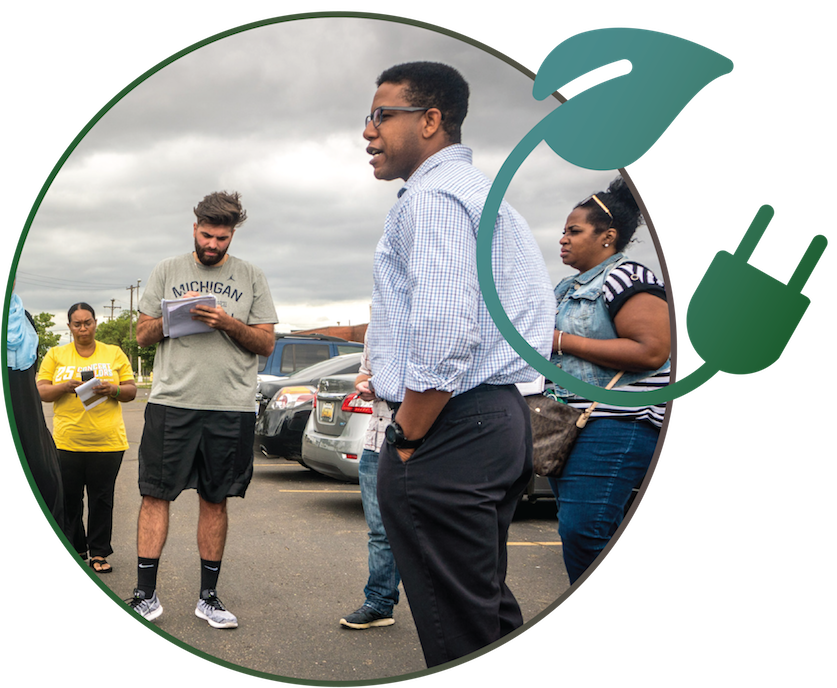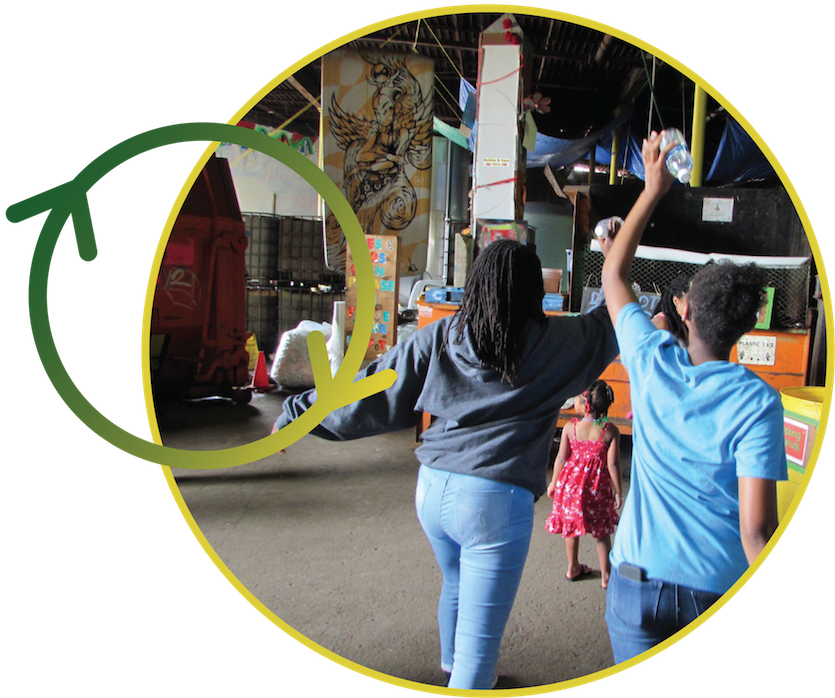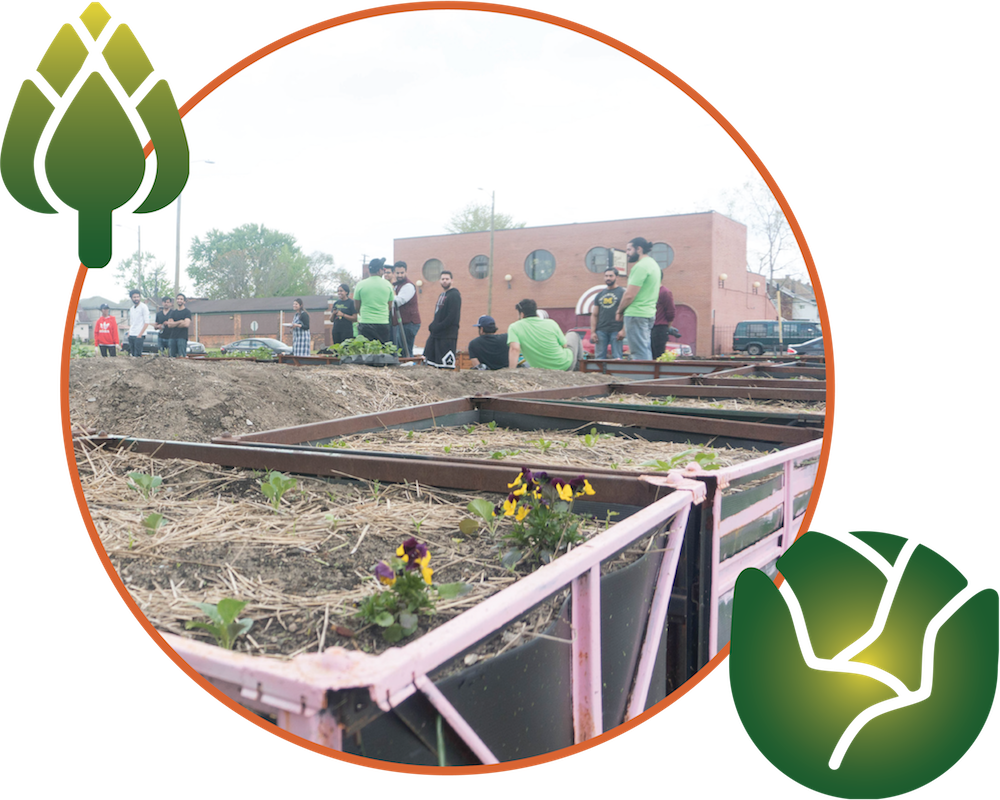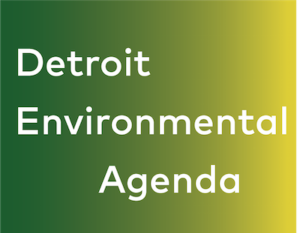
We live in a state where natural resources like fresh water, forests, and parks flourish. Our state is also known for industries, including auto plants, chemical production, and agriculture that are important to our economy. Our challenge is to balance the protection of our natural resources with our economic needs and our health.
Policies and regulations at the state level, made by our lawmakers and our leaders, can either help or harm our quality of life here in Detroit. There are many ways to have both industry and a healthy environment for all. We need your voice for policies that protect all of us now and into the future.
- SUPPORT CLIMATE RESILIENCY
- IMPROVE AIR QUALITY
- ENSURE ACCESS TO CLEAN WATER
- EXPAND RECYCLING PROGRAM
- DESIGNATE PLACES TO GROW FOOD
- PROVIDE SAFE TRANSPORTATION
SUPPORT CLIMATE RESILIENCY
We can help our state reduce the negative effects of climate change by supporting climate resiliency. Human activities have led our planet to heat at a faster rate, causing changes in climate patterns across the globe. Detroiters feel the impact of climate change during extreme rain storms that flood our streets and homes, and days of intense heat that make the air bad, even dangerous, to breathe.
ASK YOUR ELECTED OFFICIALS HOW THEY WILL:
- Champion the transition to affordable wind and solar power to reduce our dependence on fossil fuel
- Support green infrastructure development that decreases runoff to stop flooding
- Engage with Climate Action Plans in their municipalities to help communities address climate change


IMPROVE AIR QUALITY
Michigan ranks seventh in the nation in estimated deaths related to air pollution. Detroit and West Michigan are most affected by air pollution, and breathing polluted air is linked to health issues like asthma and heart disease. Action is needed now to cut exposure to pollutants.
ASK YOUR ELECTED OFFICIALS HOW THEY WILL:
- Support the enforcement of local air quality rules, by increase air quality monitoring and air filtration
- Help cut emissions from smokestacks and tailpipes that pollute our air
- Use pollution fines to pay for air filters in homes and schools
- Support the development and implementation of local greenhouse gas emissions ordinances
ENSURE ACCESS TO CLEAN WATER
In Michigan, water is our most precious resource, especially the water we use to drink, wash, and care for our families. Each year, several thousand Detroiters have had their water shut off because they could not afford their water bills. Over the last decade, water rates have more than doubled while wages have remained the same. We need to commit to clean and affordable drinking water.
ASK YOUR ELECTED OFFICIALS HOW THEY WILL:
- Enforce the Michigan Lead and Copper Rule to replace lead service lines so that all, including Detroiters, have lead-free drinking water
- Protect the Great Lakes and our freshwater from industry and aging pipelines that transfer oil and gas
- Support Detroiters’ efforts to create and implement a water affordability plan that offers an income-based based payment program for low-income residents


EXPAND RECYCLING PROGRAM
The state plays an important role in setting policies for recycling and waste (garbage) management, including composting food waste. When Detroiters throw waste away, most is burned in the incinerator, causing air pollution and unpleasant odors. Detroit has an optional curbside recycling program that 25% of residents already use.
ASK YOUR ELECTED OFFICIALS HOW THEY WILL:
- Support legislation to establish Michigan recycling and composting goals and standards
- Provide funding to help cities and counties achieve these goals and standards
DESIGNATE PLACES TO GROW FOOD
State and local policies determine whether or not residents can purchase and lease land to grow produce and earn a living. Detroit’s existing network of gardens and farms provide access to healthy, affordable, and culturally-appropriate food. Elected officials need to put measures in place to protect our network.
ASK YOUR ELECTED OFFICIALS HOW THEY WILL:
- Support incentives to reduce food waste
- Keep informed about the the urban agriculture movement in their community
- Support food businesses that support local farmers and growers


PROVIDE SAFE TRANSPORTATION
Public roads belong to all of us — whether we own a car or not. Designing safer roads means people can move around our communities safely. The Complete Streets approach allows everyone to enjoy our roads: drivers, bicyclists, public transportation riders, and pedestrians. It often includes landscaping for beauty and to help manage stormwater runoff from roadways.
ASK YOUR ELECTED OFFICIALS HOW THEY WILL:
- Offer or support creative solutions that help their community better understand complete streets
- Support the Regional Transit Authority to increase the use of public transit across southeast Michigan
- Support more walkability in our municipalities

